Economic Implications of South Africa's Downgrade to Junk Status
VerifiedAdded on 2020/04/01
|5
|1188
|76
AI Summary
The downgrade of South Africa's economy to junk status has significant implications for its long-term economic stability. The analysis focuses on three major economic indicators: the inflation rate, the economic growth rate, and unemployment. Inflation is expected to rise as borrowing costs increase and investor confidence wanes, leading to higher prices for goods and services. Economic growth will likely stagnate or decline due to increased debt burdens and reduced investment, negatively impacting living standards and government finances. Unemployment rates are anticipated to rise as businesses face financial pressures, resulting in job cuts and decreased hiring. Overall, South Africa faces a challenging path to economic recovery.
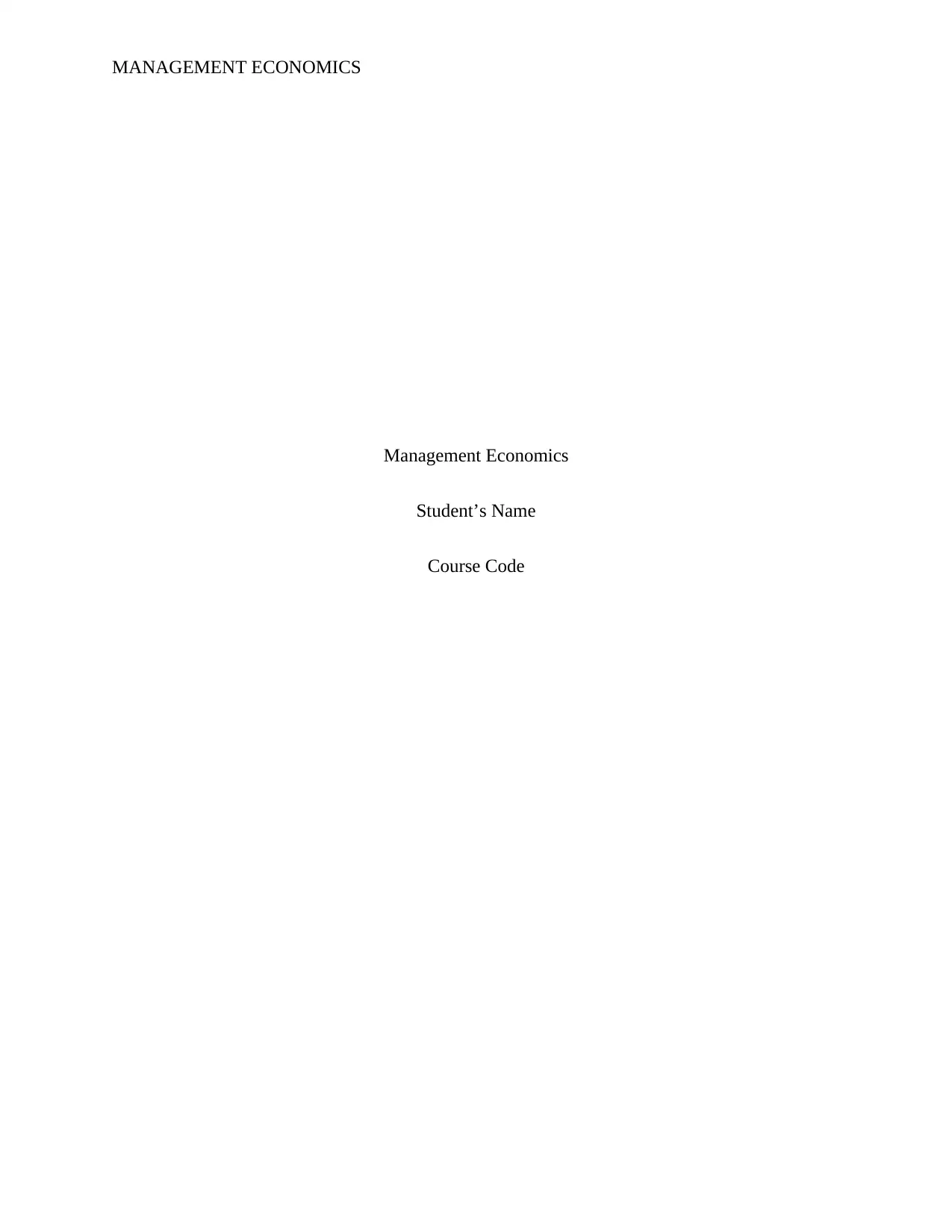
MANAGEMENT ECONOMICS
Management Economics
Student’s Name
Course Code
Management Economics
Student’s Name
Course Code
Paraphrase This Document
Need a fresh take? Get an instant paraphrase of this document with our AI Paraphraser
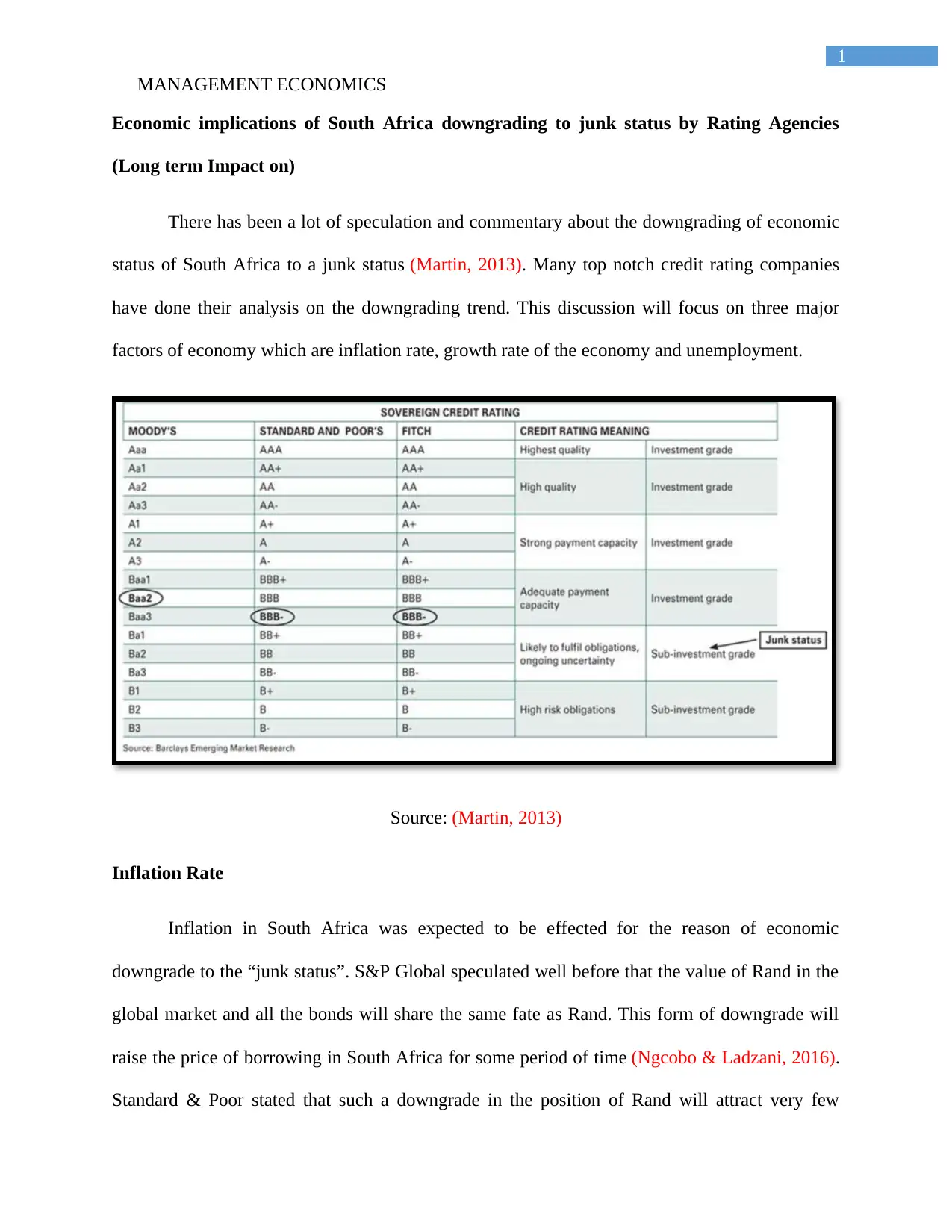
1
MANAGEMENT ECONOMICS
Economic implications of South Africa downgrading to junk status by Rating Agencies
(Long term Impact on)
There has been a lot of speculation and commentary about the downgrading of economic
status of South Africa to a junk status (Martin, 2013). Many top notch credit rating companies
have done their analysis on the downgrading trend. This discussion will focus on three major
factors of economy which are inflation rate, growth rate of the economy and unemployment.
Source: (Martin, 2013)
Inflation Rate
Inflation in South Africa was expected to be effected for the reason of economic
downgrade to the “junk status”. S&P Global speculated well before that the value of Rand in the
global market and all the bonds will share the same fate as Rand. This form of downgrade will
raise the price of borrowing in South Africa for some period of time (Ngcobo & Ladzani, 2016).
Standard & Poor stated that such a downgrade in the position of Rand will attract very few
MANAGEMENT ECONOMICS
Economic implications of South Africa downgrading to junk status by Rating Agencies
(Long term Impact on)
There has been a lot of speculation and commentary about the downgrading of economic
status of South Africa to a junk status (Martin, 2013). Many top notch credit rating companies
have done their analysis on the downgrading trend. This discussion will focus on three major
factors of economy which are inflation rate, growth rate of the economy and unemployment.
Source: (Martin, 2013)
Inflation Rate
Inflation in South Africa was expected to be effected for the reason of economic
downgrade to the “junk status”. S&P Global speculated well before that the value of Rand in the
global market and all the bonds will share the same fate as Rand. This form of downgrade will
raise the price of borrowing in South Africa for some period of time (Ngcobo & Ladzani, 2016).
Standard & Poor stated that such a downgrade in the position of Rand will attract very few
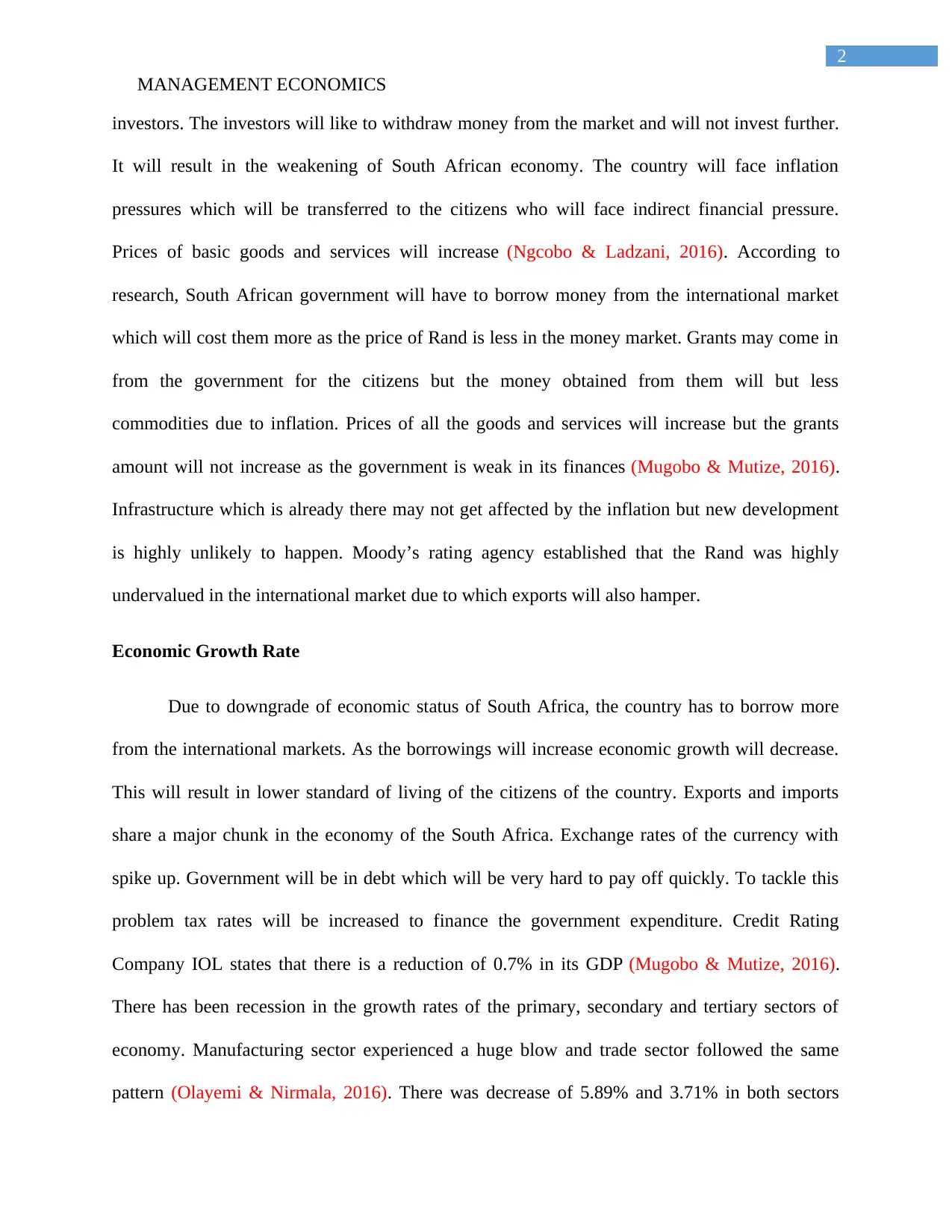
2
MANAGEMENT ECONOMICS
investors. The investors will like to withdraw money from the market and will not invest further.
It will result in the weakening of South African economy. The country will face inflation
pressures which will be transferred to the citizens who will face indirect financial pressure.
Prices of basic goods and services will increase (Ngcobo & Ladzani, 2016). According to
research, South African government will have to borrow money from the international market
which will cost them more as the price of Rand is less in the money market. Grants may come in
from the government for the citizens but the money obtained from them will but less
commodities due to inflation. Prices of all the goods and services will increase but the grants
amount will not increase as the government is weak in its finances (Mugobo & Mutize, 2016).
Infrastructure which is already there may not get affected by the inflation but new development
is highly unlikely to happen. Moody’s rating agency established that the Rand was highly
undervalued in the international market due to which exports will also hamper.
Economic Growth Rate
Due to downgrade of economic status of South Africa, the country has to borrow more
from the international markets. As the borrowings will increase economic growth will decrease.
This will result in lower standard of living of the citizens of the country. Exports and imports
share a major chunk in the economy of the South Africa. Exchange rates of the currency with
spike up. Government will be in debt which will be very hard to pay off quickly. To tackle this
problem tax rates will be increased to finance the government expenditure. Credit Rating
Company IOL states that there is a reduction of 0.7% in its GDP (Mugobo & Mutize, 2016).
There has been recession in the growth rates of the primary, secondary and tertiary sectors of
economy. Manufacturing sector experienced a huge blow and trade sector followed the same
pattern (Olayemi & Nirmala, 2016). There was decrease of 5.89% and 3.71% in both sectors
MANAGEMENT ECONOMICS
investors. The investors will like to withdraw money from the market and will not invest further.
It will result in the weakening of South African economy. The country will face inflation
pressures which will be transferred to the citizens who will face indirect financial pressure.
Prices of basic goods and services will increase (Ngcobo & Ladzani, 2016). According to
research, South African government will have to borrow money from the international market
which will cost them more as the price of Rand is less in the money market. Grants may come in
from the government for the citizens but the money obtained from them will but less
commodities due to inflation. Prices of all the goods and services will increase but the grants
amount will not increase as the government is weak in its finances (Mugobo & Mutize, 2016).
Infrastructure which is already there may not get affected by the inflation but new development
is highly unlikely to happen. Moody’s rating agency established that the Rand was highly
undervalued in the international market due to which exports will also hamper.
Economic Growth Rate
Due to downgrade of economic status of South Africa, the country has to borrow more
from the international markets. As the borrowings will increase economic growth will decrease.
This will result in lower standard of living of the citizens of the country. Exports and imports
share a major chunk in the economy of the South Africa. Exchange rates of the currency with
spike up. Government will be in debt which will be very hard to pay off quickly. To tackle this
problem tax rates will be increased to finance the government expenditure. Credit Rating
Company IOL states that there is a reduction of 0.7% in its GDP (Mugobo & Mutize, 2016).
There has been recession in the growth rates of the primary, secondary and tertiary sectors of
economy. Manufacturing sector experienced a huge blow and trade sector followed the same
pattern (Olayemi & Nirmala, 2016). There was decrease of 5.89% and 3.71% in both sectors
⊘ This is a preview!⊘
Do you want full access?
Subscribe today to unlock all pages.

Trusted by 1+ million students worldwide
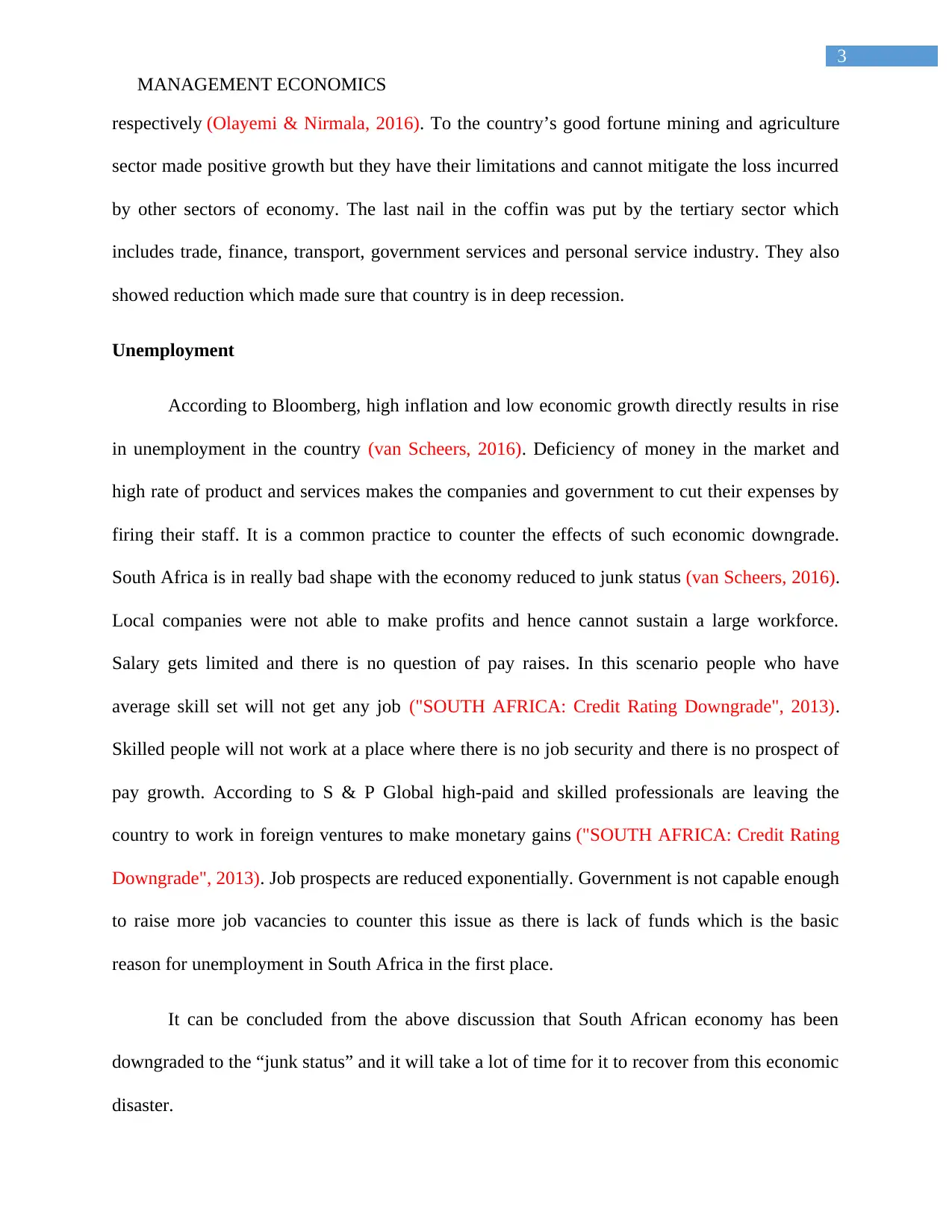
3
MANAGEMENT ECONOMICS
respectively (Olayemi & Nirmala, 2016). To the country’s good fortune mining and agriculture
sector made positive growth but they have their limitations and cannot mitigate the loss incurred
by other sectors of economy. The last nail in the coffin was put by the tertiary sector which
includes trade, finance, transport, government services and personal service industry. They also
showed reduction which made sure that country is in deep recession.
Unemployment
According to Bloomberg, high inflation and low economic growth directly results in rise
in unemployment in the country (van Scheers, 2016). Deficiency of money in the market and
high rate of product and services makes the companies and government to cut their expenses by
firing their staff. It is a common practice to counter the effects of such economic downgrade.
South Africa is in really bad shape with the economy reduced to junk status (van Scheers, 2016).
Local companies were not able to make profits and hence cannot sustain a large workforce.
Salary gets limited and there is no question of pay raises. In this scenario people who have
average skill set will not get any job ("SOUTH AFRICA: Credit Rating Downgrade", 2013).
Skilled people will not work at a place where there is no job security and there is no prospect of
pay growth. According to S & P Global high-paid and skilled professionals are leaving the
country to work in foreign ventures to make monetary gains ("SOUTH AFRICA: Credit Rating
Downgrade", 2013). Job prospects are reduced exponentially. Government is not capable enough
to raise more job vacancies to counter this issue as there is lack of funds which is the basic
reason for unemployment in South Africa in the first place.
It can be concluded from the above discussion that South African economy has been
downgraded to the “junk status” and it will take a lot of time for it to recover from this economic
disaster.
MANAGEMENT ECONOMICS
respectively (Olayemi & Nirmala, 2016). To the country’s good fortune mining and agriculture
sector made positive growth but they have their limitations and cannot mitigate the loss incurred
by other sectors of economy. The last nail in the coffin was put by the tertiary sector which
includes trade, finance, transport, government services and personal service industry. They also
showed reduction which made sure that country is in deep recession.
Unemployment
According to Bloomberg, high inflation and low economic growth directly results in rise
in unemployment in the country (van Scheers, 2016). Deficiency of money in the market and
high rate of product and services makes the companies and government to cut their expenses by
firing their staff. It is a common practice to counter the effects of such economic downgrade.
South Africa is in really bad shape with the economy reduced to junk status (van Scheers, 2016).
Local companies were not able to make profits and hence cannot sustain a large workforce.
Salary gets limited and there is no question of pay raises. In this scenario people who have
average skill set will not get any job ("SOUTH AFRICA: Credit Rating Downgrade", 2013).
Skilled people will not work at a place where there is no job security and there is no prospect of
pay growth. According to S & P Global high-paid and skilled professionals are leaving the
country to work in foreign ventures to make monetary gains ("SOUTH AFRICA: Credit Rating
Downgrade", 2013). Job prospects are reduced exponentially. Government is not capable enough
to raise more job vacancies to counter this issue as there is lack of funds which is the basic
reason for unemployment in South Africa in the first place.
It can be concluded from the above discussion that South African economy has been
downgraded to the “junk status” and it will take a lot of time for it to recover from this economic
disaster.
Paraphrase This Document
Need a fresh take? Get an instant paraphrase of this document with our AI Paraphraser
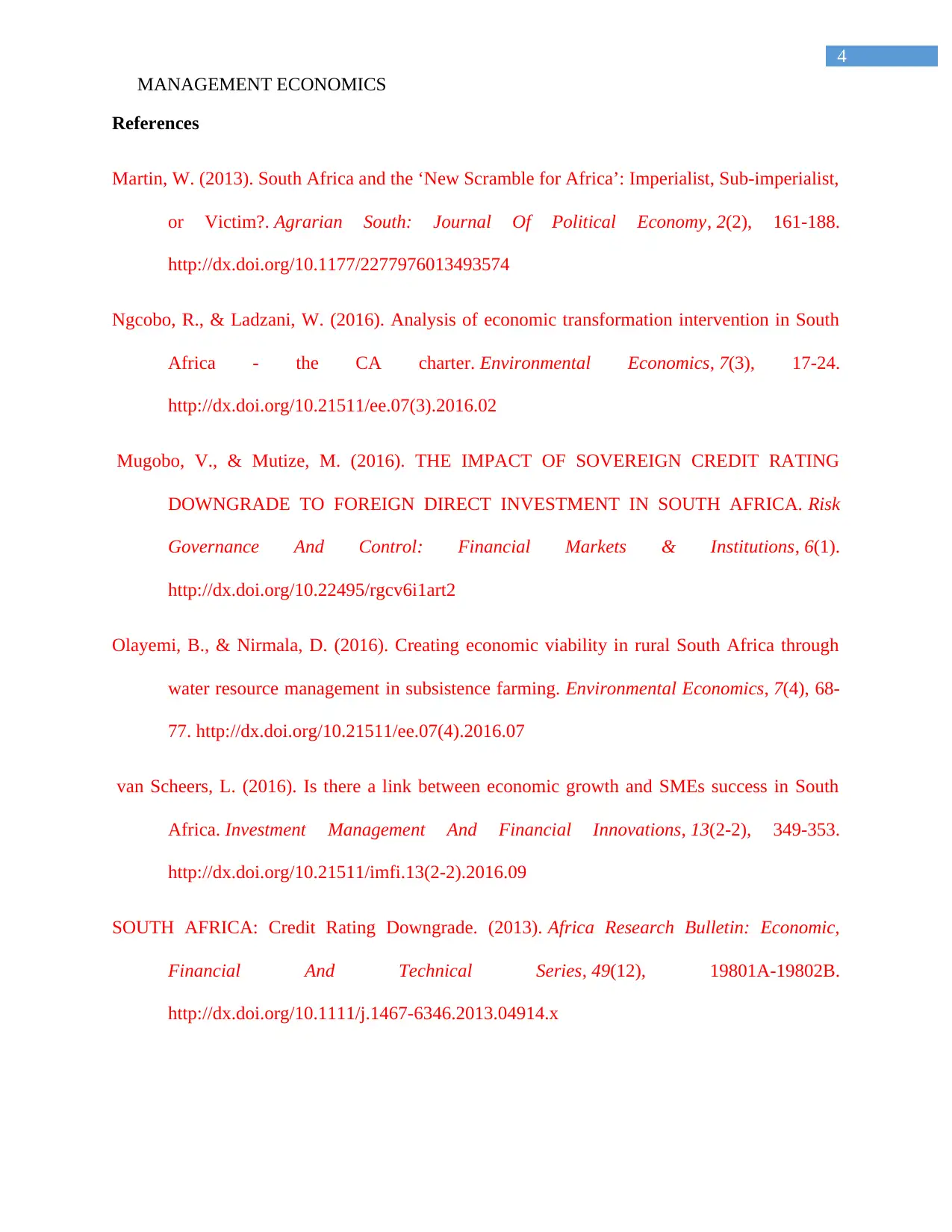
4
MANAGEMENT ECONOMICS
References
Martin, W. (2013). South Africa and the ‘New Scramble for Africa’: Imperialist, Sub-imperialist,
or Victim?. Agrarian South: Journal Of Political Economy, 2(2), 161-188.
http://dx.doi.org/10.1177/2277976013493574
Ngcobo, R., & Ladzani, W. (2016). Analysis of economic transformation intervention in South
Africa - the CA charter. Environmental Economics, 7(3), 17-24.
http://dx.doi.org/10.21511/ee.07(3).2016.02
Mugobo, V., & Mutize, M. (2016). THE IMPACT OF SOVEREIGN CREDIT RATING
DOWNGRADE TO FOREIGN DIRECT INVESTMENT IN SOUTH AFRICA. Risk
Governance And Control: Financial Markets & Institutions, 6(1).
http://dx.doi.org/10.22495/rgcv6i1art2
Olayemi, B., & Nirmala, D. (2016). Creating economic viability in rural South Africa through
water resource management in subsistence farming. Environmental Economics, 7(4), 68-
77. http://dx.doi.org/10.21511/ee.07(4).2016.07
van Scheers, L. (2016). Is there a link between economic growth and SMEs success in South
Africa. Investment Management And Financial Innovations, 13(2-2), 349-353.
http://dx.doi.org/10.21511/imfi.13(2-2).2016.09
SOUTH AFRICA: Credit Rating Downgrade. (2013). Africa Research Bulletin: Economic,
Financial And Technical Series, 49(12), 19801A-19802B.
http://dx.doi.org/10.1111/j.1467-6346.2013.04914.x
MANAGEMENT ECONOMICS
References
Martin, W. (2013). South Africa and the ‘New Scramble for Africa’: Imperialist, Sub-imperialist,
or Victim?. Agrarian South: Journal Of Political Economy, 2(2), 161-188.
http://dx.doi.org/10.1177/2277976013493574
Ngcobo, R., & Ladzani, W. (2016). Analysis of economic transformation intervention in South
Africa - the CA charter. Environmental Economics, 7(3), 17-24.
http://dx.doi.org/10.21511/ee.07(3).2016.02
Mugobo, V., & Mutize, M. (2016). THE IMPACT OF SOVEREIGN CREDIT RATING
DOWNGRADE TO FOREIGN DIRECT INVESTMENT IN SOUTH AFRICA. Risk
Governance And Control: Financial Markets & Institutions, 6(1).
http://dx.doi.org/10.22495/rgcv6i1art2
Olayemi, B., & Nirmala, D. (2016). Creating economic viability in rural South Africa through
water resource management in subsistence farming. Environmental Economics, 7(4), 68-
77. http://dx.doi.org/10.21511/ee.07(4).2016.07
van Scheers, L. (2016). Is there a link between economic growth and SMEs success in South
Africa. Investment Management And Financial Innovations, 13(2-2), 349-353.
http://dx.doi.org/10.21511/imfi.13(2-2).2016.09
SOUTH AFRICA: Credit Rating Downgrade. (2013). Africa Research Bulletin: Economic,
Financial And Technical Series, 49(12), 19801A-19802B.
http://dx.doi.org/10.1111/j.1467-6346.2013.04914.x
1 out of 5
Related Documents
Your All-in-One AI-Powered Toolkit for Academic Success.
+13062052269
info@desklib.com
Available 24*7 on WhatsApp / Email
![[object Object]](/_next/static/media/star-bottom.7253800d.svg)
Unlock your academic potential
Copyright © 2020–2025 A2Z Services. All Rights Reserved. Developed and managed by ZUCOL.





